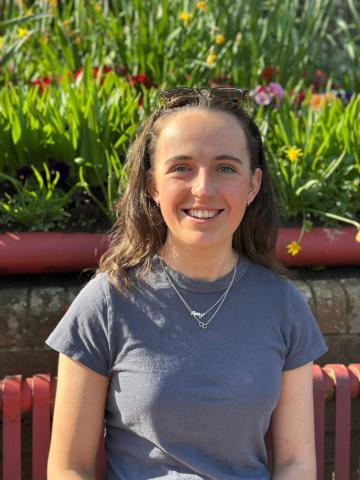Antimicrobial resistance is invisible, I am not – Amy’s Story

Next week is World Antimicrobial Resistance Awareness Week (WAAW) and the Public Health Agency (PHA) is highlighting a powerful account of one individual’s fight against AMR to encourage everyone to join the collective effort to help reduce the threat posed by the misuse of antibiotics.
When people are prescribed an antibiotic, they expect to take the drug and get better, but due to Antimicrobial Resistance (AMR) that is not always the case, and one Portstewart woman’s experience of AMR highlights the importance of protecting our medicines.
Amy Symington is a past pupil of Coleraine Grammar School and as an avid hockey player who represented Ulster Hockey in the U16s, keeping fit and healthy was always a priority.
Amy said: “AMR has been the greatest threat to my life, and meant that an infection in my hip soon became life changing.
“I am 21 years old and currently in my second year of studying pharmacy in Manchester. I have always been really active – growing up, hockey was my passion and I continued to play at university. In February 2024 I got a pain in my hip, which I initially thought nothing of. I thought if I just took some paracetamol it would pass, but it didn’t.
“It gradually got worse and worse and eventually got to the point where I couldn't walk or put any weight on it due to the pain. I flew back home and my parents met me at the airport and took me straight to hospital. From there things progressed quite quickly, I got blood tests and CT scans, and that showed that I had an abscess in my hip.
“The abscess became septic and then it came back that it was MRSA which stands for Methicillin-Resistant Staphylococcus aureus. It is a type of bacteria that usually lives harmlessly on the skin. However, if it gets inside the body it can be dangerous.
“It was scary to hear that I had MRSA, I had no idea where it even came from. I spent around four weeks in hospital, trying lots of different antibiotics as it can be difficult to treat and not killed by some of the common antibiotics.
“After that I needed rehabilitation. I had to start to build myself back up and learn how to walk again.
“It's definitely been a really frightening experience and one that's taken a big toll on my life. But thankfully now I've kept well over the last year and been able to get back to Manchester and return to my studies, but unfortunately, I haven't been able to fully get back into sport again. The infection has left me with joint problems that still continue to give me bother, but I'm just so grateful to everyone at the Royal Victoria Hospital who helped me to still be here today.”
What are antimicrobial resistant infections?
Bronagh McBrien, AMR Programme Manager at the PHA, said: “Anyone can get an antimicrobial resistant infection, even if you have never had an antibiotic yourself.
“Antimicrobial resistant infections are created when antibiotics are not used correctly and the bacteria they were designed to treat evolve over time and become resistant to antibiotics. We are all at risk of becoming infected with bacteria that are resistant, as happened to Amy.
“We can’t see these changes happening so it’s easy for people not to think about it, as it is invisible. But when infections such as MRSA are no longer affected by antibiotics, they can become difficult or impossible to treat, increasing the risk of spread, severe illness, disability and death.
“The introduction of antibiotics was arguably the greatest medical breakthrough of the 20th century, making many modern medical procedures possible, including cancer treatment, organ transplants and open-heart surgery. But now AMR has been identified as one of the most pressing global challenges we face this century.
“Prior to her infection Amy was a fit, healthy and very active young women – if this can happen to her, it can happen to anyone. We all have a part to play in protecting antibiotics.”
Professor Cathy Harrison, Chief Pharmaceutical Officer at the Department of Health (DoH), said: “Antibiotics are now becoming less effective due to antibiotic resistance, and it is vital that we all take action now to keep antibiotics working for the future.
“Antibiotics do not work against viral infections such as colds and flu. Your local community pharmacist can provide advice and appropriate treatment to help you feel better, without the need for a GP appointment.
“If you are prescribed an antibiotic, follow the directions for use carefully and always remember to complete the full recommended course.
“Any unused antibiotics should be returned to a community pharmacy for safe disposal. Attempting to dispose of antibiotics at home can contribute to pharmaceutical pollution of our waterways and further antibiotic resistance.”
You can play an important role in limiting AMR by:
- Ask your pharmacist about over-the-counter medicines to help you to manage symptoms. Most simple infections clear up on their own.
- Take your doctor’s advice and don’t expect to receive antibiotics for minor ailments and common infections.
- If your doctor prescribes an antibiotic, make sure you take it according to your doctor’s instructions.
- Return any unused antibiotics to your local pharmacy.
- Never share antibiotics with anyone else, including pets, and don’t take antibiotics that haven’t been prescribed for you.
- Regularly washing your hands and keeping up to date with vaccinations to help prevent infections plays a part too.
